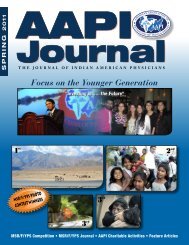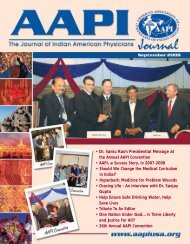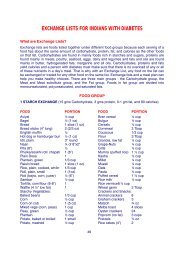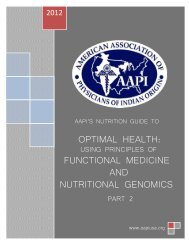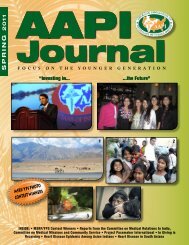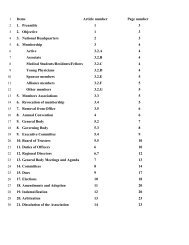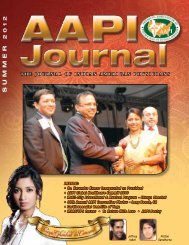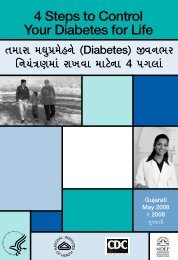functional medicine and nutritional genomics - American Association ...
functional medicine and nutritional genomics - American Association ...
functional medicine and nutritional genomics - American Association ...
Create successful ePaper yourself
Turn your PDF publications into a flip-book with our unique Google optimized e-Paper software.
AAPI’S NUTRITION GUIDE TO OPTIMAL HEALTH: USING PRINCIPLES OF FUNCTIONAL MEDICINE AND NUTRITIONAL GENOMICS<br />
For a variety of reasons, infants <strong>and</strong> children are<br />
more prone to dehydration than adults. Symptoms<br />
of mild dehydration include tiredness, muscle<br />
weakness, lightheadedness, <strong>and</strong> headache.<br />
In children with autism, these symptoms can be<br />
easily missed. Children with autism often have<br />
expressive language delays or are non-verbal <strong>and</strong><br />
unable to express their thirst. Some children with<br />
autism do not even recognize the sensation of<br />
thirst <strong>and</strong> therefore never ask for water. These<br />
children are especially susceptible to dehydration.<br />
Subtle though the symptoms may be, dehydration<br />
will have a major impact on how the child feels<br />
both physically <strong>and</strong> mentally, his ability to function<br />
normally, <strong>and</strong> his ability to excrete toxins out of<br />
his body. The chart below lists the total amount<br />
of water a child should consume daily (26).<br />
The amount of total water a child needs will vary<br />
according to their level of physical activity, medical<br />
problems, <strong>and</strong> weather environment in which you<br />
live. A Registered Dietitian can calculate more<br />
exactly the total amount of water a child requires<br />
based on their individual needs.<br />
ADEQUATE INTAKE OF WATER<br />
Age Group Total Water<br />
Children Liters/day Cups/day<br />
1 – 3 years 1.3 5<br />
4 – 8 years 1.7 7<br />
Males<br />
9 – 13 years 2.4 10<br />
14 – 18 years 3.3 14<br />
> 19 years 3.7 15<br />
Females<br />
9 – 13 years 2.1 9<br />
14 – 18 years 2.3 10<br />
>19 2.7 11<br />
Source: Food <strong>and</strong> Nutrition Board, Institute of<br />
Medicine, National Academies<br />
Eliminating toxins from drinking water – It is<br />
important to consider the source of the water for<br />
a child because safe, uncontaminated drinking<br />
water is vital to his health (53, 54). In the<br />
autism community, neurotoxins are a major<br />
concern <strong>and</strong> many parents try to eliminate heavy<br />
metals from their children’s environment as much<br />
124<br />
as possible. Common sources of water pollutants<br />
include:<br />
� Biological agents (bacteria, viruses,<br />
parasites)<br />
� Inorganic chemicals (arsenic, lead,<br />
mercury, chromium, nitrates)<br />
� Organic chemicals (pesticides, benzene,<br />
polychlorinated biphenyls, trichloroethylene)<br />
� Disinfectant chemicals (chlorine, chlorine<br />
dioxide, chloramines, haloacetic acid,<br />
trihalomethanes)<br />
� Radionuclides (radon)<br />
These pollutants can affect major body organs<br />
such as the kidneys <strong>and</strong> liver; promote certain<br />
forms of cancer, leukemia, <strong>and</strong> anemia; <strong>and</strong> may<br />
affect the neurological <strong>and</strong> gastrointestinal systems<br />
(55, 56). Consider the use of a home water<br />
purification system, such as a reverse osmosis<br />
water filter, to reduce various contaminants in<br />
drinking water.<br />
3) TREAT GASTROINTESTINAL PROBLEMS<br />
Gastrointestinal problems involving the esophagus,<br />
stomach, small intestine, <strong>and</strong> colon are very<br />
common among children with autism (57, 58,<br />
59, 60, 61). It appears that GI problems are<br />
more prevalent in children with autism than other<br />
children. In a study published in the Journal of<br />
the Developmental <strong>and</strong> Behavioral Pediatrics in<br />
2006, 70 percent of children with autism were<br />
found to have a lifetime history of gastrointestinal<br />
symptoms, such as abnormal stools, constipation,<br />
frequent vomiting, <strong>and</strong> abdominal pain (62). A<br />
research article released September 2011 by<br />
Williams, Hornig, Buie, et al. indicated that GI<br />
activity of children with autism differs from other<br />
children primarily in two ways; intestinal cells show<br />
abnormalities in how they break down <strong>and</strong><br />
transport carbohydrates, <strong>and</strong> their intestines have<br />
abnormal amount of certain bacteria (63). A<br />
consensus report published January 2010 in<br />
Pediatrics stated that problem behavior in children<br />
with autism spectrum disorders may be the primary<br />
or sole symptoms of gastrointestinal disorders<br />
(64).<br />
2012




